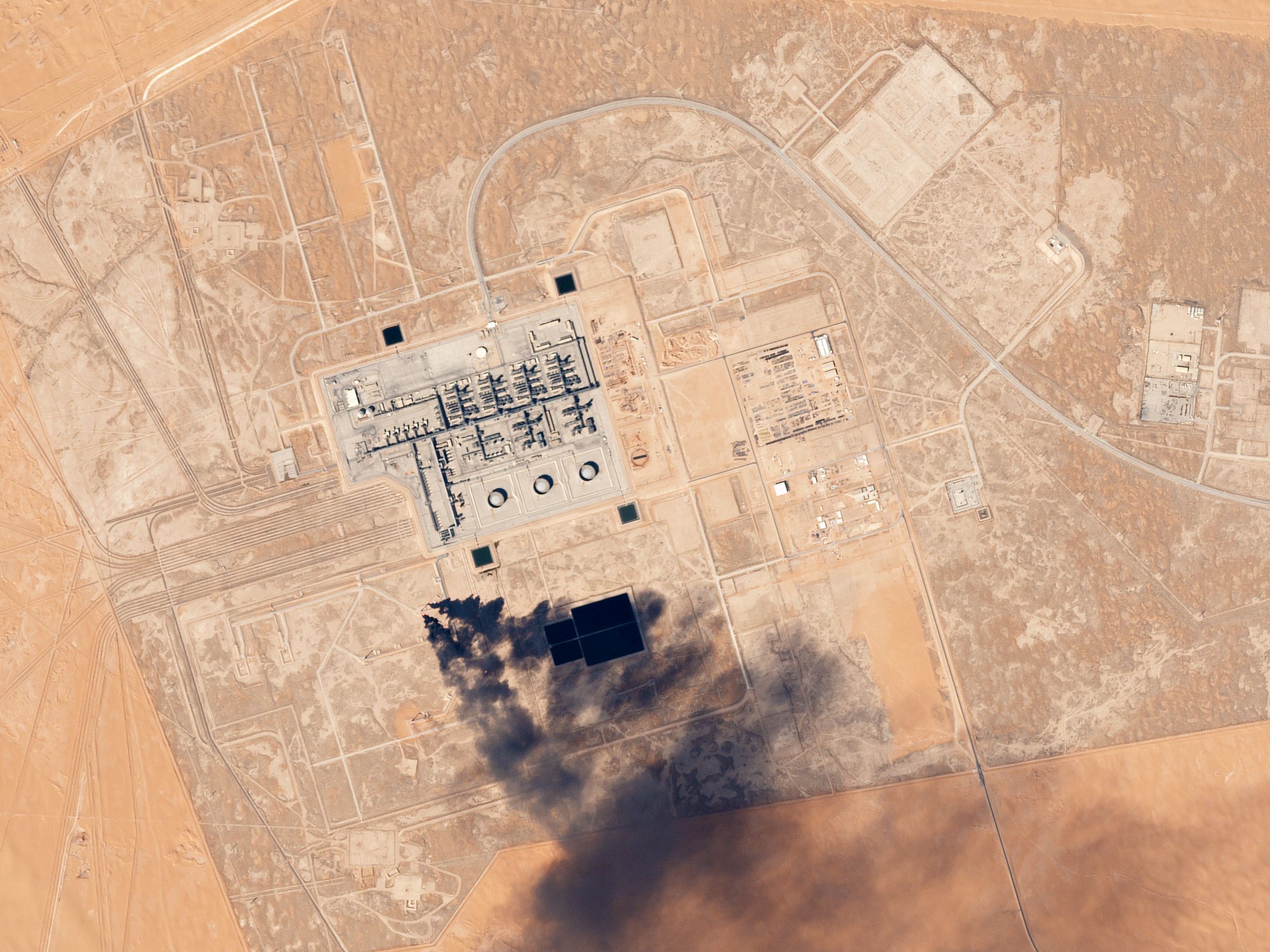By Max Wilbert / Featured image: an oil processing facility in Saudi Arabia, Planet Labs, CC BA-SA 4.0
On Saturday, September 14th, a “suicide drone” attack struck the Abqaiq oil processing facility in Buqayq, Saudi Arabia. The drones were destroyed in the attack, but at this time it is not believed that the operators were exposed or harmed in any way.
Abqaiq is the largest oil facility in the world, with the capacity to process 7% of global oil supplies. Before the attack it was refining around 6.8 million barrels of oil per day. The attack is believed to have reduced Saudi Oil production by 50 percent, or 6 million barrels per day. That’s equivalent to the national usage of India and Australia combined, or more than 1/3rd of the United States oil consumption.
Saudi Arabia produces 10% of the global supply of crude oil. Therefore, this single attack, believed to have been carried out with roughly 10 drones with a range of less than 100 miles, cut world oil production by 5 percent.
The use of drones in warfare has risen over the past five years. Initially, large UAVs (Unmanned Aerial Vehicles) designed by U.S. weapons manufacturers dominated drone warfare. Increasingly, however, small and even off-the-shelf drones are being used in asymmetrical conflict to great effect. For example, in Syria, Daesh (Isis) and Hezbollah have both been recorded using inexpensive off-the-shelf drones to scout and direct fire for ground troops, to drop small bombs, and as “suicide bombers.”
Environmentalists should take heed. This one attack—albeit an attack unlikely to be motivated by concern for the planet and ecology—has been more effective than the entire environmental movement, which has failed to stop the growth in fossil fuel production and consumption. These new tactics change how strategies such as Decisive Ecological Warfare could be implemented.
Some people may worry about the environmental damage caused by such a massive fire. But we should remember that all the petroleum processed at this refinery would have been burned anyway. The only difference is that it would have been burned while powering cargo ships, mining platforms, tanks, and other destructive industrial infrastructure. It is always preferable to see petroleum burn all at once, with no application, than to have it all burned over time while aiding in the destruction of the planet. The destruction of the equipment also means that more fossil fuels will stay in the ground for longer, since if there is no nearby processing capacity for them, extraction must stop. With very few exceptions, the living world would benefit from any fossil fuel infrastructure being destroyed, no matter how “messy” that destruction is.


You make a probably false assumption that this attack accomplished anything beyond a small and temporary disruption of oil supply. If people don’t change their attitudes and behaviors regarding the natural world, starting with prioritizing it over self-centered BS like opulent consumptive lifestyles and overbreeding, we’ll just continue to see more of the same. There’s far too much of this crap all over the planet to destroy a substantial amount of it permanently, so we need to work on “hearts and minds,” not physical destruction.
I forgot to mention a couple of points in my previous comment.
First, the destroyed refinery will be repaired or replaced. So other than a short disruption of 5% of oil, what environmentally was accomplished in this attack?
Second, while I’m all for guerrilla warfare when appropriate (big fan of Ho Chi Minh), I don’t know that setting a massive amount of oil on fire accomplishes anything at all. Maybe it prevents oil from being spilled, and in a best case but very low probability scenario causes so much financial harm that it doesn’t get replaced (highly unlikely). But this fire will cause massive air pollution including adding a substantial amount of greenhouse gases to our atmosphere, and your statement that, “[i]t is always preferable to see petroleum burn all at once, with no application, than to have it all burned over time while aiding in the destruction of the planet” makes no sense.